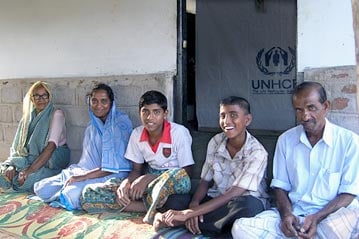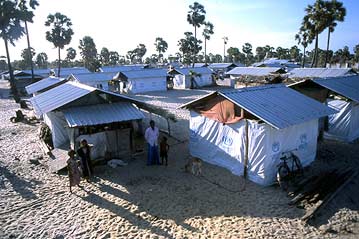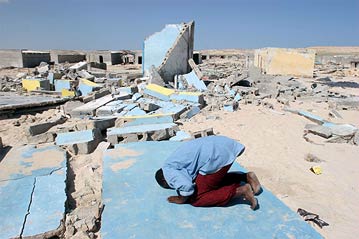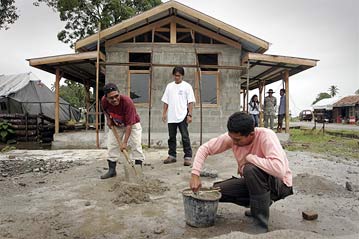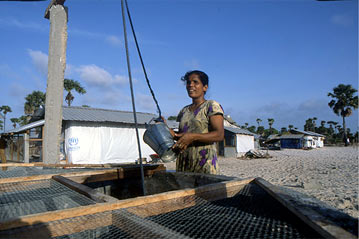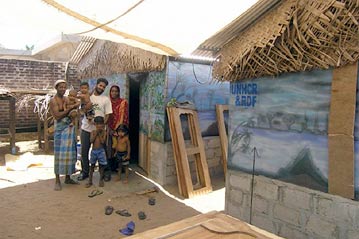Indonesia: UNHCR assists nearly 12,000 previously-undiscovered tsunami survivors
Indonesia: UNHCR assists nearly 12,000 previously-undiscovered tsunami survivors
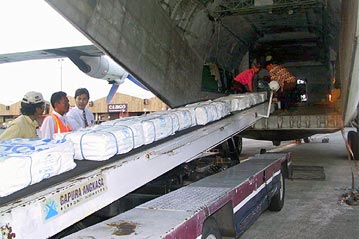
LAMNO, Indonesia, Jan. 14 (UNHCR) - The UN refugee agency has found nearly 12,000 tsunami victims on northern Sumatra island whose urgent needs for shelter and aid had previously been unknown.
"A UNHCR security assessment mission that went out from Banda Aceh today by helicopter to Lamno, on Aceh's west coast, found more than half of the total population of 23,400 displaced and in urgent need of shelter and assistance," UNHCR spokesman Ron Redmond said in Geneva on Friday. "We are hoping to helicopter in relief supplies as soon as possible."
Also on the ground in Indonesia, the three Swiss Super Puma helicopters placed at the disposal of UNHCR and other agencies are expected to be operational on Monday. "This will significantly boost our operational and logistical capacity," Redmond said.
The helicopters will be based for the time being in Medan and will have an operational route of Medan-Meulaboh (1 hour), Medan-Banda Aceh (2 hours) and Banda Aceh-Meulaboh (1 hour).
On Friday, UNHCR in Banda Aceh started distributing some of its 2,000 tents to house displaced people at a temporary settlement that has been set up in the grounds of the local television station.
This week, three UNHCR chartered flights ferried supplies of plastic sheeting, tents and non-food relief items to Banda Aceh from Jakarta, supplies which had earlier been airlifted from UNHCR's central and regional warehouses in Copenhagen and Dubai.
"By this weekend, 60-70 percent of the more than 400 tonnes airlifted into Indonesia will be in northern Sumatra, and we are planning one final convoy from Jakarta next week to move the rest of our supplies north," Redmond said.
In addition to Indonesia, UNHCR is also assisting survivors of the Dec. 26 tsunami in Sri Lanka and Somalia, capitalizing on its expertise in emergencies to play an unprecedented role in natural disaster relief.
Next week, UNHCR's Assistant High Commissioner, Kamel Morjane, is scheduled to visit Sri Lanka to review UNHCR's work on behalf of people displaced by the tsunami and the conflict. He will be joined by the Director of UNHCR's Bureau for Asia and the Pacific, Janet Lim, and the Director of the Department of International Protection, Erika Feller.
Some 130,000 tsunami-displaced people have so far received UNHCR shelter and non-food relief items in Sri Lanka. Since December 26, the refugee agency has distributed more than 20,000 pieces of plastic sheeting, over 25,000 mats, more than 15,000 articles of clothing and some 8,000 mosquito nets and kitchen sets, among other items.
Three airlifts from Copenhagen and New Delhi have brought in additional supplies for the displaced Sri Lankans over recent days, and 7,500 tents are expected to be airlifted and shipped to Sri Lanka from UNHCR supplies in Jordan. This weekend, UNHCR will airlift portable warehouses from Colombo to its offices in Trincomalee, Batticaloa and Ampara.
More people have been leaving temporary accommodation centres in Sri Lanka, either for home or to live with friends or relatives. According to government statistics, there are still more than 425,000 people displaced by the tsunami, but the number of temporary accommodation centres has dropped to 444 from over 700 at the height of the displacement crisis.
"But given that more than 130,000 houses have been destroyed by the tidal waves, there will be people who are unable to go home in the near future," Redmond said. "UNHCR is working with the government and international agencies on the design of semi-permanent shelters that will respect the basic rights of the displaced people to security and privacy, as well as sanitation and health facilities. The special needs of women and children must also be taken into consideration."
On a related issue, UNHCR is advising the Sri Lankan government on the need to ensure the land rights of people who could be affected by a draft law to create a 300-metre buffer zone from the sea.

